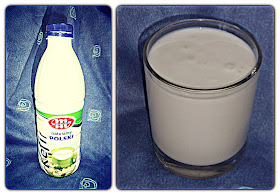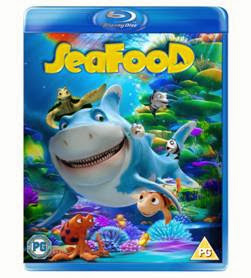I have mentioned in the past some of the Polish products I have been buying at Tesco, like kefir and soft cheese (which I talked about in the recipe post on
syrniki, Russian cheese scones). Bakoma kefir is sadly not available anymore, but there is another good kefir -
Mlekovita Naturalny Polski kefir, which has a good level of acidity and is very creamy as well. I buy a bottle weekly, and it is a very enjoyable drink, which I can recommend if you're looking for a dairy drink different from yogurts. It has a lot of health benefits for bones and teeth as well as digestive system. It is 127 kcal per serving (a glass), and I much prefer it to any diet milkshakes in the morning.
While doing my grocery shopping online, I followed the link to the Polish food section and was amazed to discover that Tesco sells over 110 food products imported from Poland. Clearly this is the situation of demand and supply. I would love to know how many authentic Italian products they sell (if you search for the word Italian, most of the products are actually not the Italian produce but British foods imitating the Italian cuisine).
As I am very curious when it comes to new foods, I decided to try a selection of Polish food.
Some were old favourites which I remembered from my childhood in Russia, some are totally new to me. I am by no means claiming to have done a thorough research of the selection, but just thought you might like to know which products we tested. I wish I read some reviews before I made some of my decisions.
Lubella Kasza Gryczana or Roasted buckwheat groats is another great product. As a kid growing in Russia, I have eaten the buckwheat kasha very often. It is a healthy food, and you can serve it either with milk (typical meal for children) or as a side dish with fried meat or vegetables. Buckwheat from Lubella comes in a box which contains 4 portions (very generous, if you ask me). You cook them in sachets, like rice in bags for about 6-8 minutes. Convenient and easy. Excellent quality product which I would score as 5/5.
Dawtona Ogorki kwaszone or Cucumbers in brine
If you are used to the British style of pickled cucumbers/gherkins which are more often than not are reeking of vinegar, you might find these cucumbers different. They are preserved in salted water with spices. Though this is the Polish product, it is very similar to the type of canning/pickling which is widespread in Russia. The cucumbers are bigger in size than gherkins. They are lovely with meat or cheese, or in salads like
Vinegret or
Salad Olivier (Russian salad). They are not very crunchy, and I would have liked to see garlic cloves and dill inside for the extra flavour, but they are not bad at all. And the brine is considered to be a good cure for hangover. Score: 3+/5.
Miod Wielokwiatowy or Multiflower Honey is produced by a beekeeping farm Sadecki Bartnik, and is a blend of EU honeys. I would so love to see honey from small producers, which is not a blend of some unknown EU and non-EU entities. Pick a jar of honey in any supermarket, and in most cases they are a blend of EU and non-EU honeys, which in my eyes makes it more of a syrup than honey and also diminishes its health benefits. Nowadays I prefer to buy either a local honey at the farmers' market or one-country honey, like New Zealand or Greece, but it's getting more difficult to get unblended honeys. My favourite Italian honey that I used to buy in Waitrose isn't available anymore, and even those brands which are very British sell a mix of honeys from all over the world, God knows what is mixed there.
Anyway, going back to the Multiflower Honey, it is a clear runny honey, very pleasant and flavourful. Tastewise, I have no complaints. It is lovely with pancakes and in Greek yogurt.
If it were produced at the specific farm in Poland and not mixed there, I would give it a very good score. As it is mixed, it loses points, hence is my score of 3+/5.
Pamapol Bigos (home made hunters' stew) contains sauerkraut, white cabbage, sausage meat, pork etc and an alarming amount of E-numbers (E250, E452, E451, E450, E331, E407, E1422). If I picked it up in the store, I would have put it back.
Taste-wise it is quite forgettable. And I only tried it myself, I would definitely not offer my kids this chemical cocktail.
I have tried a proper Polish bigos many years ago, when we lived in the States. My older son was a newborn, and our friend Margo brought several jars of homemade bigos for me. It was very tasty.
Pamapol bigos doesn't have the right cabbage/sauerkraut ratio, there's more cabbage than sauerkraut here. The meat tastes very processed, not chunky enough.
1/5, it's a definite No-No for the future.
I was very excited to see
Ptasie Melczko waniliowe (lit. bird's milk) or vanilla marshmallows in chocolate on the list of Polish products. Bird's Milk used to be my favourite Russian chocolates, when I was a kid. I haven't tried them for almost twenty years, and was delighted to discover that they taste exactly as I remember them.
Very light fluffy inside and chocolatey on the outside. I'm not sure if marshmallows would be the exact translation, as the texture is different, they are less chewy than marshmallowy, but that's what they are sold as in Tesco. They are delightful, and I absolutely loved them. It is also possible that I am swayed by my childhood memories, as I also offered them to a couple of friends to try. One wasn't enthusiastic at all, the other liked them and asked me to get her a box next time I do grocery shopping online. I will be buying them again as a treat for myself.
For the pure sentimental reason I will give them a top score (though beware there are a couple of hidden E-numbers. How did we survive before without them? (meant ironically)). 5/5
 |
| Ptasie Mleczko or Bird's milk |
I have bought more Polish foods from Tesco, which I haven't tried yet, once I have, I will be adding to this post.
My suggestions to Tesco: to give more detailed information on each foreign product, after all, not all of us can speak/read Polish. For example, there is a Lubella Maka Puszysta Tortowa Flour 1kg. And no more information, on what kind of flour it is, self-raising, plain, wholemeal? On seeing the image of the cake on the packet, you might think it is a cake mix of some sort. Surely if you list and sell the product, you could add more information like a proper list of ingredients (I noticed some products have it already).
Are there any products from the Polish food range that you have tried and would recommend?





















































